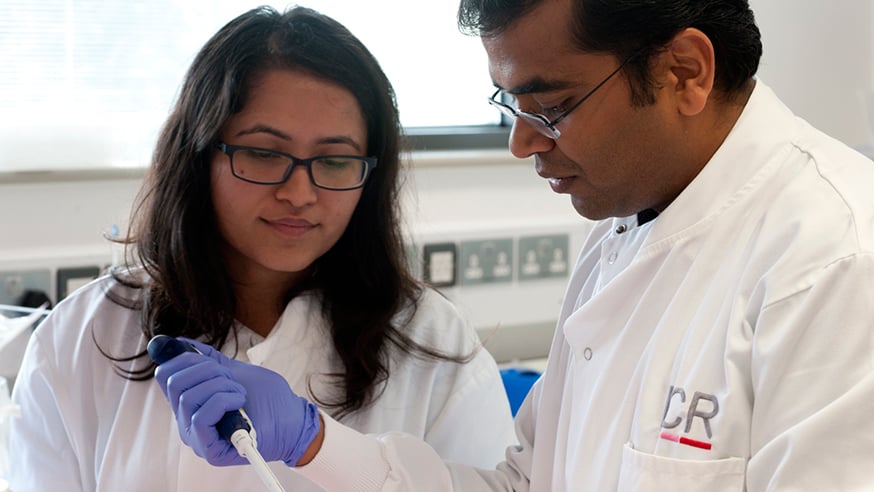
At The Institute of Cancer Research, London, we are proud to be one of the UK’s leading research institutes for promoting gender equality. We are an organisation that thrives on diversity – with researchers from different disciplines and backgrounds working together to tackle complex problems. We recruit internationally – our staff and students come from more than 50 countries.
Between 2011 and 2017, the ICR more than doubled its numbers of female professors. We follow our postdoc alumni – those who reach mid-level research roles and then move on – and we know that women and men are equally successful in gaining senior team leader roles after they leave the ICR.
Dr Vanessa McKean, Equality, Diversity and Inclusion Manager at the ICR, works in our Learning and Organisational Development team and leads our work to create a culture that recognises all.
She says: “We’ve undertaken research to gain greater understanding of the experiences of women and minorities in the ICR and consult regularly with our research associations and equality networks, including our Minority Ethnic Association and our LGBT+ network.
“We are proud to be one of only a few research institutes in the UK to hold an organisation-wide Athena SWAN Silver award in recognition of the impact of our work to address gender inequalities.
“But we’ve also identified areas where we still need to do more to promote equality, through a co-ordinated programme of data-gathering and initiatives.”
Under-representation
One of the key areas of inequality at the ICR – and the academic research sector as a whole – is that women and those from a minority ethnic background are still underrepresented in senior roles. The ICR takes this under-representation very seriously.
Dr McKean says: “We’ve undertaken analyses of all our careers paths and identified points at which women leave research careers – sometimes called the ‘leaky pipeline’.
“About 30 per cent of our scientists at Team Leader level are women, but we know this is consistent with the proportion of applications we have. This means we are focusing our efforts on encouraging more applications from women.”
Our aim at the ICR is to create a supportive work environment and provide good career support for both women and men, and to remove any unnecessary barriers to career progression for all.
Read more
Career paths
Dr McKean and her colleagues analyse data from every staff group across the ICR – not only the academic career paths – because there are different issues affecting different groups.
For example, women are more likely than men to join the ICR in technical scientific officer roles, and the majority of our clinical trials staff are women. We are currently finding out more about why these career paths are more appealing to women and not men.
Dr McKean says: “The reasons for such gender imbalances are not limited to the ICR, but are often structural imbalances built into the culture of scientific research. There are often very simple steps that can be taken to address them.
“We’ve reviewed our recruitment and promotions processes, so that they take into account career breaks and part-time working, for example. Our recruiters are trained to recognise the biases they may bring unconsciously to interview and selection.”
Career development
A key part of our equality programme involves continuously reviewing and expanding our career support for all staff groups, including expansion of our mentoring and training programmes.
For example, women from the ICR have been participating in the Leadership Foundation’s women-only Aurora programme, which develops future female leaders in higher education.
Our own Future Leaders programme is offered to our female corporate and technical staff, and our colleagues at our partner hospital, The Royal Marsden NHS Foundation Trust. Recently – after reviewing evidence on gender balance and development needs – we opened it up to men.
Support for parents and carers
A key focus for the ICR in the past 12 months has been implementing further support for parents and carers.
Dr McKean says: “We are running workshops for new parents and parents-to-be to help them at work, aiming to increase uptake of paid ‘keeping in touch’ days, driving greater uptake of our maternity coaching scheme and implementing other recommendations from our recent parents' and carers’ survey.”
It’s also important to enable networking for scientists within work hours – particularly for research organisations like the ICR, which takes a team science approach to much of its work. We aim to bring researchers together in new ways to inspire collaborations.
As well as bringing staff together to network at events like our regular ‘megacoffee’ afternoons for junior researchers and technical staff, organised by staff associations, the ICR has also called on universities to do much more to offer women more networking opportunities.
This year, we have also implemented new guidance for our staff on holding meetings inside the working day. In the New Year, parents will be able to bring their children into our laboratories for a family day, in response to demand from parents.
We are training the next generation of researchers; by supporting a PhD studentship, you could help us advance personalised prostate cancer treatment.
Read more
Inclusive culture
We are proud of our support for women in careers at the ICR – and of our work to develop an inclusive culture, creating an environment in which all staff and students can fully contribute, feel welcomed and develop their talents.
But part of making an improvement is in acknowledging where improvements need to be made, and understanding what the barriers are to equality.
We are addressing these challenges, and aiming to work with and influence our colleagues at other academic organisations to do the same.
comments powered by